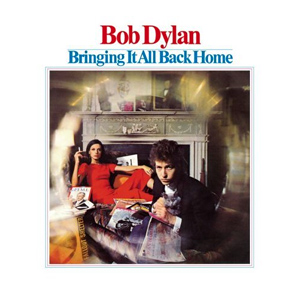Sally Grossman with Bob Dylan
There's a poetry documentary shot sometime in the Sixties in which Robert Creeley talks while his then-wife Bobbie listens and throws in occasional observations of her own. But interjections are all she gets to make. She has a place at the table, but her role is to be there as witness to her husband's speech, his insights, to be (I can't help thinking) in her rapt attentive state a sort of boast that reinforces his importance. Creeley, we learned when Bobbie found her own voice, was open about his expectation of the woman he lived with. He did not want to compete with another writer. But conscious or unconscious misogyny were a habit of the times.
bobbielouisehawkins.com
This afternoon I watched the D.A. Pennebaker masterpiece Don't Look Back for the first time in years and I saw something in it that I'd never seen before: the silence of the women. Several women appear in the film; some make interjections like Bobbie Hawkins and the others say nothing at all. The only exception is Joan Baez, who's extremely vocal, sings songs (mostly Dylan's) and follows Bob from town to town hoping (we learn when we read a little deeper) that he will invite her onto the stage as she had invited him when his star was in the ascendant in America. He doesn't reciprocate. Another woman silenced, at least publicly, although Joan didn't really need Dylan's help. Her reputation as one of folk music's greatest artists is undiminished 55 years after the movie was shot.
Joan Baez
Don't Look Back is about Bob Dylan, of course, and the frantic nature of his growing fame. It's not about Joan Baez, although Pennebaker does seem interested in her as a subject; and Allen Ginsberg has only a minimal role - although he features in the outstanding sequence for Subterranean Homesick Blues that opens the film, and was already infamous enough to need no introduction. But the presence of Sally Grossman seems almost decorative, and Marianne Faithfull sits so quietly in Dylan's noisy hotel room you would hardly know she's there (the grainy black & white film Pennebaker uses makes her harder to see, I have to admit). It's Alan Price who talks and sings, and Donovan who Bob seems almost threatened by until he meets him. Many Dylan fans feel he deliberately owns Donovan by singing It's All Over Now, Baby Blue after the latter's To Sing For You when they are trading songs at the hotel. Bob's is undoubtedly the better song, but Donovan asks him to sing it, and Dylan looks pleased by the request.
Who is the woman who sings with Alan Price backstage at one of the shows and gamely tries to be heard over the chorus of loud male voices? This may be common knowledge among bigger Dylan fans than me (although I have admired him for nearly forty years), and among devotees of Alan Price; but I've been searching on the internet for two days and I can't even find her picture. Nor can I find any information about Jones Alk, other than that she was the first wife of Howard Alk, the bearded, bespectacled, bear-like figure in the movie who seems ready to throw people out of the hotel room for Bob when a beer bottle is dropped out of the window.
Howard was a filmmaker and Jones is clearly recording sound throughout the film. So you might not expect her to speak anyway. But in a long sequence toward the end of the film, when Dylan confronts an admirably restrained reporter from Time magazine, Pennebaker makes the curious decision to shoot the interview from such an angle that only Dylan and Jones can be seen, notwithstanding cutaways to the reporter; other people, the men in Dylan's entourage, can be heard, joining in with Bob's impertinent attack on the reporter in what looks to me like an act of collective bullying (I know many would find that an absurd statement), but they have had their exposure earlier in the movie. Jones is in full view for 6 minutes and says nothing at all; she smokes and listens with rapt attention, as if what she's hearing is provoking the deepest thoughts. Her presence at the table is so similar to Bobbie Louise Hawkins' in its nature and symbolism it can't be a coincidence.
The difference is that Jones doesn't speak at all. I can't be the only one who wants to know if she agreed with Dylan that Time would be improved by collages or that he was onto something when he said each word had its little letter and big letter. I'd like to think that she was really writing a poem in her head as I sometimes do when someone else is talking too much; but I suppose we'll never find out.



No comments:
Post a Comment